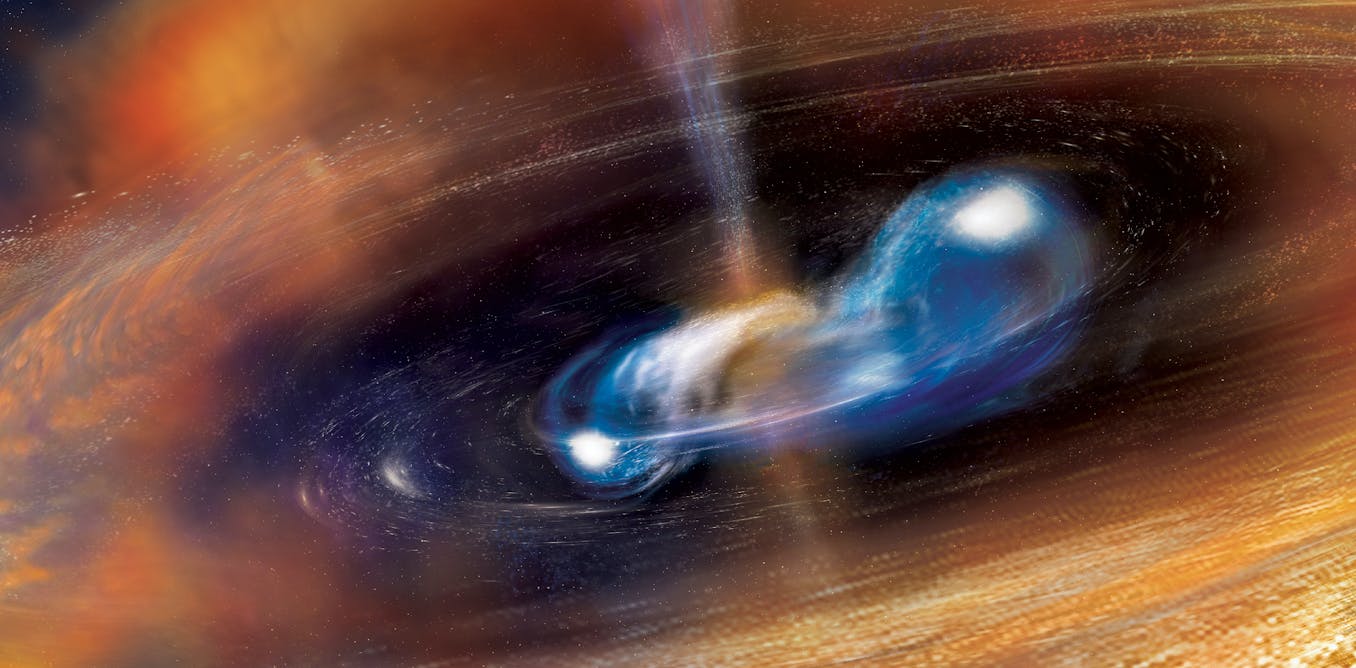A bright flash of gamma rays from the constellation Boötes that lasted nearly one minute came from a kilonova, as we described in a new paper. This finding challenges what astronomers know about some of the most powerful events in the universe.
The unusual cosmic explosion was detected by the Neil Gehrels Swift observatory on Dec. 11, 2021, as the satellite orbited Earth. When astronomers pointed other telescopes at the part of the sky where this large blast of gamma rays – named GRB211211A – came from, they saw a glow of visible and infrared light known as a kilonova. The particular wavelengths of light coming from this explosion allowed our team to identify the source of the unusual gamma-ray burst as two neutron stars colliding and merging together.
Gamma rays are the most energetic form of electromagnetic radiation. In just a few seconds, a gamma-ray burst blasts out the same amount of energy that the Sun will radiate throughout its entire life. Gamma-ray bursts are the most powerful events in the universe, and astronomers think only two cosmic scenarios can produce gamma-ray bursts.
...
For over 20 years, astronomers thought that kilonovae accompanied short gamma-ray bursts and supernovae accompanied long ones. So when our team started looking at the wealth of data and images collected on the minute-long burst in December 2021, we expected to see a supernova. Much to our surprise, we found a kilonova.
Why it matters
Kilonovae are cosmic factories that create heavy metals, including gold, platinum, iodine and uranium. Because they enrich the chemical composition of the universe, kilonovae are critical to providing the basic ingredients for the formation of planets and life.
GRB211211A’s long duration contradicts existing theories of how gamma-ray bursts relate to supernovae and kilonovae. This finding shows that there is still a lot astronomers like us don’t understand about these powerful and important processes and suggests that there may be other ways the universe can produce heavy metals.

 theconversation.com
theconversation.com
The unusual cosmic explosion was detected by the Neil Gehrels Swift observatory on Dec. 11, 2021, as the satellite orbited Earth. When astronomers pointed other telescopes at the part of the sky where this large blast of gamma rays – named GRB211211A – came from, they saw a glow of visible and infrared light known as a kilonova. The particular wavelengths of light coming from this explosion allowed our team to identify the source of the unusual gamma-ray burst as two neutron stars colliding and merging together.
Gamma rays are the most energetic form of electromagnetic radiation. In just a few seconds, a gamma-ray burst blasts out the same amount of energy that the Sun will radiate throughout its entire life. Gamma-ray bursts are the most powerful events in the universe, and astronomers think only two cosmic scenarios can produce gamma-ray bursts.
...
For over 20 years, astronomers thought that kilonovae accompanied short gamma-ray bursts and supernovae accompanied long ones. So when our team started looking at the wealth of data and images collected on the minute-long burst in December 2021, we expected to see a supernova. Much to our surprise, we found a kilonova.
Why it matters
Kilonovae are cosmic factories that create heavy metals, including gold, platinum, iodine and uranium. Because they enrich the chemical composition of the universe, kilonovae are critical to providing the basic ingredients for the formation of planets and life.
GRB211211A’s long duration contradicts existing theories of how gamma-ray bursts relate to supernovae and kilonovae. This finding shows that there is still a lot astronomers like us don’t understand about these powerful and important processes and suggests that there may be other ways the universe can produce heavy metals.

Unusual, long-lasting gamma-ray burst challenges theories about these powerful cosmic explosions that make gold, uranium and other heavy metals
Gamma-ray bursts occur when a massive star explodes or when two neutron stars merge. A newly discovered burst has puzzled astronomers, as it lasted much longer than astronomers would have expected.
 theconversation.com
theconversation.com
